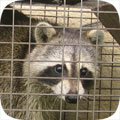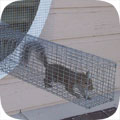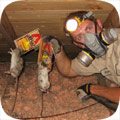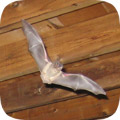- grandview@wildlifeanimalcontrol.com
Call 24/7 for a free quote:
816-479-0462
Grandview Wildlife Animal Control
Professional Wildlife Removal Company Servicing Grandview, MO
If you have a problem with wildlife in your Grandview home, your best option is to hire a company that specializes in Missouri wildlife removal only. This is a specialty business, and regular pest control companies do not use the proper techniques to solve animal problems. I have spent many years reviewing Missouri and Grandview, and I recommend the following:
Wildlife Removal Professionals
Cell Phone: 816-479-0462
NOTE: If you have a dog or cat problem, call Jackson County Animal Services: 816-316-4817

Wildlife Removal Professionals specializes primarily in removing animals from attics of homes and buildings - this includes squirrels in attics, raccoons, and rats or mice in homes. Missouri also has a documented problem with
bats in buildings, and Wildlife Removal Professionals is specially trained in bat removal. They also perform general wildlife trapping services, such as the capture and removal of skunks or opossums on the
property. Call 816-479-0462 to discuss your critter problem and schedule a same-day or next-day appointment. Click here to learn more about
what prices we charge in 2025.
When hiring a company to solve your wild animal problem, you want these features:
- Specializes in wildlife removal, not pest control
- Fully Missouri and Jackson County licensed and insured
- Works 7 days per week (critters don't take weekends off)
- Performs full building inspections: enters and inspects attic
- Performs exclusion repairs, with guarantee against animal re-entry
- Offers cleanup of biohazardous wildlife waste
Wildlife Removal Professionals is a full-service Grandview wildlife removal company. This is very different from a regular Grandview pest control company. The pest control companies spray poison to kill insects. This is not at all
similar to wildlife removal. Wildlife Removal Professionals performs a full inspection of the home or property, and determines why the animal(s) are there, and if inside a building, how the animals got inside. All
animals (including rodents) are trapped and removed, or if possible, removed from the building using special exclusion devices. Once the animals are gone, preventative repairs are essential, and
cleanup is sometimes recommended.
 Grandview wildlife trapping - it's not as simple as it may seem. It's illegal in Missouri to trap without a license. Trap type is very important and there are many different types, bait is somewhat relevant, trap placement
is vital, and there are dozens of small things that are very important to know.
Safety is a concern. Then once the animal is trapped, it must be removed and dealt with in the proper manner according to Missouri law. We offer Grandview raccoon removal. Read more about how to get rid of raccoons.
Grandview wildlife trapping - it's not as simple as it may seem. It's illegal in Missouri to trap without a license. Trap type is very important and there are many different types, bait is somewhat relevant, trap placement
is vital, and there are dozens of small things that are very important to know.
Safety is a concern. Then once the animal is trapped, it must be removed and dealt with in the proper manner according to Missouri law. We offer Grandview raccoon removal. Read more about how to get rid of raccoons.
 Animals in attics - this is our specialty at Wildlife Removal Professionals. Many types of animals like to live in attics. This includes squirrels, raccoons, rats, mice, bats, birds, and even possums. Critters like to go into attics for a safe place to live
and raise their young. Removing animals from attics is very complex work, partly because of the presence of baby animals. If you need Grandview squirrel removal, we can remove all the squirrels from your attic, and seal out any future ones. Read more about how to get rid of squirrels.
Animals in attics - this is our specialty at Wildlife Removal Professionals. Many types of animals like to live in attics. This includes squirrels, raccoons, rats, mice, bats, birds, and even possums. Critters like to go into attics for a safe place to live
and raise their young. Removing animals from attics is very complex work, partly because of the presence of baby animals. If you need Grandview squirrel removal, we can remove all the squirrels from your attic, and seal out any future ones. Read more about how to get rid of squirrels.
 Rodent control must be done in a very specific way. First off, the most important thing is that all the openings that rats and mice can use to enter a house be sealed. Then all the rodents must be physically trapped and removed.
Never, ever use poison! Most Grandview exterminators will just use this lazy poison technique to kill rodents, and it causes more harm than good - dead stinky rats, and it doesn't solve the problem. Call us for correct Grandview rat removal. Read more about how to get rid of rats.
Rodent control must be done in a very specific way. First off, the most important thing is that all the openings that rats and mice can use to enter a house be sealed. Then all the rodents must be physically trapped and removed.
Never, ever use poison! Most Grandview exterminators will just use this lazy poison technique to kill rodents, and it causes more harm than good - dead stinky rats, and it doesn't solve the problem. Call us for correct Grandview rat removal. Read more about how to get rid of rats.
 Bat removal is a highly specialized task. Missouri is known to have colonizing bats who often live in buildings. Bats love attics. If not removed, the colony can grow to a very large size over the years. The bat droppings are often corrosive and
cause health risks. The same goes for bird droppings on or in buildings. We perform Grandview pigeon removal and bird control. But our specialty is Grandview bat removal. We remove 100% of the bat colony and seal the building so that it's totally bat-proof. Read more about how to get rid of bats.
Bat removal is a highly specialized task. Missouri is known to have colonizing bats who often live in buildings. Bats love attics. If not removed, the colony can grow to a very large size over the years. The bat droppings are often corrosive and
cause health risks. The same goes for bird droppings on or in buildings. We perform Grandview pigeon removal and bird control. But our specialty is Grandview bat removal. We remove 100% of the bat colony and seal the building so that it's totally bat-proof. Read more about how to get rid of bats.
 If you have animals inside a house, no job is complete without proper exclusion repairs. If you simply hire a Grandview trapper who only removes the critters, then the problem will return. You need to hire a Grandview wildlife control company that identifies 100% of the animal entry points
into your building, and seals them shut with professional repairs. In addition, in many cases animals have left waste or contamination behind, and you'll want a company that can provide professional cleaning services. Wildlife Removal Professionals does both.
If you have animals inside a house, no job is complete without proper exclusion repairs. If you simply hire a Grandview trapper who only removes the critters, then the problem will return. You need to hire a Grandview wildlife control company that identifies 100% of the animal entry points
into your building, and seals them shut with professional repairs. In addition, in many cases animals have left waste or contamination behind, and you'll want a company that can provide professional cleaning services. Wildlife Removal Professionals does both.
The above are just some of the services offered by Wildlife Removal Professionals. We also trap and remove animals that destroy lawns, such as moles, or digging animals. Sometimes animals like opossums will live under buildings, steal pet food, raid garbage cans, etc.
Read about how to get rid of opossums. Skunks commonly live under sheds or decks, and set up a den. We can trap and remove them without them spraying. Read about how to get rid of skunks. Wildlife Removal Professionals
also provides dead animal removal in Grandview. If you need help with any other wildlife conflict, from a fox, beaver, groundhog, or any other critter, we can solve it. We also do Grandview snake removal - most of the snakes in Missouri are not venomous, but
call us if you want safe removal, or read about how to get rid of snakes in Grandview. And remember, we are a private business, not Jackson County Animal Control Services, so if you have a dog or cat problem, call the County at 816-316-4817.
Jackson County animal services does not handle any wildlife issues.
Wildlife Removal Professionals
Cell Phone: 816-479-0462
Grandview Pricing Info
Every wildlife removal situation is different, from the species of animals involved, the location of the animal inside a house or outside, the extent of repairs or cleanup, etc. It's impossible to give one-size-fits-all prices. Examples MIGHT include:Small Job: For example, a one-stop job to remove an animal in the yard: $100 on up
Medium Job: For example, getting critters out of your house with minor repairs: $300 on up
Large Job: For example, a project involving many service trips and complex work: $500 on up
Give us a phone call now and tell us about your wildlife issue and we will be able to give you a price estimate over the phone. If you're cool with it, we can schedule a same-day or next-day appointment if you like. Our prices are fair, and a good value because we do the job right, the first time.
Grandview Wildlife Tip #1:
Do skunks warn before spraying?
Skunks are considered very cute creatures to the point where a lot of people have a skunk as a pet. This is a good and bad thing at the same time since you never know when they are going to spray in your face. The real question here is if they tend to warn you or give out a sign that they are about to spray?
In order for them not to pray on your face is to de-scent them. They will mostly likely spray you out of nowhere unless they have been descanted occurring to what they have. It is better to des-scented your pet skunk so you can avoid any mishaps in the future. This will also give you a sense of peace knowing that you will not get sprayed at anytime soon!
The reason why the skunks spray is so dangerous since it is made up of seven volatile components along with an oily substance. The reason of the strong order is because most of the spray components is made up of sulfur which is very unpleasant for people. The good news is that the smell can actually vary from one skunk to another depending on the state of their body as well as their age. The weird part is that these sprays are actually hidden in the anal gland in the rectum.
Many people tend to ask if the spray can be refilled after they have already sprayed once, the answer is yes. Within a few hours it can actually be filled again and ready to spray. The two ways the sprays can occur is either within the cloud (which is much bigger than usual) and in a direct stream but within a small range. However, they can easily hit within 6 feet away and they would definitely do this on purpose as well. After they tend to spread their spray they run away before getting caught by the person.
Whenever you see a skunk stomping his ground that means he is upset because he previously had gotten abused and is not too happy about it. The skunk may be walking on his paws along with showing his teeth. This implies that the user should slowly back away before anything very harmful takes place. When this occurs the best thing any person can do is run far away from the skunk because she may blow any minute and that will cause serious damage!
The reason why the spray is so bad for people is because it gives eyes and nose irritation, which you should tend to watch right away. As well as washing yourself with other chemicals that kill the chemicals the skunk has spray on you. And in order to remove the smell you will need to wash yourself in tomato juice as well as other fruits just to remove the hard odor. However, it will never be removed a 100% at the time, but I can stay and help your decision.
Grandview Wildlife Tip #2:
Missouri Wildlife Information:
Missouri State bird: Eastern bluebird
State mammal: Missouri mule
State reptile: Three-toed box turtle
State amphibian: North American bullfrog
State fish: Channel catfish, paddlefish
State insect: European honeybee
Missouri is a state that is wetter than most people think. It was originally classified as a southern state, and eventually became grouped with the states in the Midwest. As far as Midwest states go, however, it is full of wet grasslands which gradually culminate through foothills into the Ozark Mountains. Though much of the landscape is flat, the region has a fair amount of forest. It is humid with hot summers and cold winters.
A state with such ample grasslands is bound to have a good number of large grazing animals, and Missouri definitely fits the bill. This state has white-tailed deer, elk, and American bison. The bison, which are growing in popularity for food consumption around the globe, are in both wild and semi-wild herds. Their numbers are significantly less than when they roamed the plains hundreds of years before pioneers came through.
No predators are large enough in Missouri to take down a full-sized bison, though sick adults and young calves will occasionally be prey for coyotes or mountain lions. It is rare to see a mountain lion out on the plains; in fact, it is rare to see one of the big cats at all. The species vanished from Missouri in the 1970's only to reappear in the mid 1990's. The game commission in the state does not feel there is a breeding population of the cats, and any cougar sightings are animals that have come in from other states.
Another creature that enjoys life out in the grasslands is the badger. These aggressive, intimidating animals are excellent diggers, and they live primarily off a diet of rodents found in prairie grass. The badger can be a fierce protector of its den, and people are advised to keep their distance from this critter.
There is, of course, no shortage of home invading species in Missouri. The state has an ample supply of raccoons, foxes, bats, skunks, porcupines, opossums, nutria, muskrats, and squirrels.
The wetlands in the region are home to a few animals that are slowly vanishing as the swamps dry up. The swamp rabbit is a critter found in the southern swamps of Missouri, and its numbers have been steadily declining as the wetlands get destroyed. Another species that is gradually going away is the alligator snapping turtle, a reptile that can grow to be 150 pounds.
You can always call Wildlife Removal Professionals, any time of day, at 816-479-0462, for a price quote for Grandview wildlife control services. I am confident that this is the best choice amongst wildlife removal companies in Grandview, MO.







































